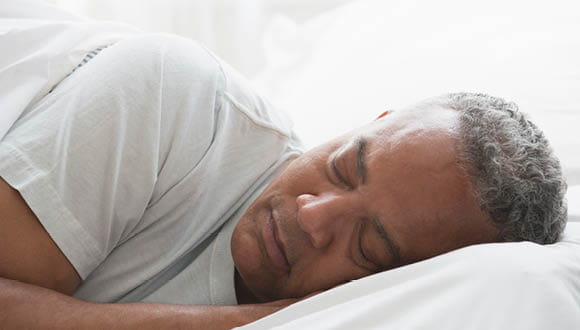New Sleep Apnea Treatments: From CPAP Machines to New Alternatives — Know Your Options
June 9, 2021 - Katie McCallumThere are the obvious reasons to get serious about treating your obstructive sleep apnea.
Poor sleep. The resulting sleepiness during the day. Snoring that wakes up the whole house. Peace of mind for your partner laying next you, who panics with every gasp for air you take while asleep.
Then there are the health consequences if sleep apnea is left untreated:
- High blood pressure
- Metabolic syndrome
- Type 2 diabetes
- Heart disease and heart attack
- Nonalcoholic fatty liver disease
- Stroke
"Aside from the impacts it can have on your sleep, productivity and relationship, sleep apnea is one of the so-called 'silent killers' that should not be ignored. If you have sleep apnea, do not forgo treatment," warns Dr. Omar Ahmed, ENT doctor specializing in sleep surgery at Houston Methodist.
Depending on your condition, sleep apnea treatments can range from breathing machines to surgery.
Your doctor can help you understand which option is best for you, but Dr. Ahmed is here to answer common questions about sleep apnea treatment options.
How do CPAP machines work?
While oral appliances worn in the mouth can help reduce symptoms of sleep apnea, the majority of sleep apnea sufferers are prescribed a sleep apnea machine.
"The first line of treatment for almost any case of sleep apnea is a CPAP machine, which is short for continuous positive air pressure machine," says Dr. Ahmed. "This is a device you wear every night that helps you breathe more normally as you sleep."
As the machine works, it delivers oxygen into your nose and mouth via a mask. This air keeps your airway open, preventing any interruptions in your breathing.
"Treating sleep apnea using a CPAP machine can lower your risk for chronic health conditions, as well as improve sleep and daytime productivity. However, people may find the mask uncomfortable to wear all night. You need to use it every night to gain the full benefits of this machine."
In addition, Dr. Ahmed points out that the machine itself has drawbacks. Not only will you need to pack it and take it with you when you travel, but the noise it makes may be frustrating for your sleeping partner.
When is surgery needed for sleep apnea?
For individuals with sleep apnea who don't like using a CPAP, sleep surgery is an option. In addition, surgery may be needed if you have very severe sleep apnea that can't be fully managed by a CPAP.
"What we've realized over the years is that, since everyone's anatomy is different, the reason your breathing is obstructed at night may be different than for someone else. So, there are various surgeries for sleep apnea, depending on where your specific obstruction is located," explains Dr. Ahmed.
To locate the obstruction, drug-induced sleep endoscopy is performed. While you're asleep, an endoscope is used to look at your throat and identify where you're obstructing.
"With this information, we can choose the surgical option that's best for you," adds Dr. Ahmed.
For instance, if your primary collapse occurs at your palate, uvulopalatopharyngoplasty (UPPP) can help prevent this. If your collapse is at the base of your tongue, surgery may be used to bring the tongue forward, promoting better breathing. Additionally, if the back of your tongue is overly large, base of tongue reduction surgery can be used to enlarge your airway.
"There are many different surgical techniques available to treat sleep apnea. The majority of the time, a person won't need to use a CPAP machine anymore after having sleep surgery to fix his or her obstruction."
A CPAP alternative: How does hypoglossal nerve stimulator for sleep apnea work?
For someone who would prefer not to use a CPAP, the surgical options above may still seem intimidating.
But advancements in sleep apnea treatment have made new, less-invasive procedures an option for treating moderate to severe sleep apnea.
"As an alternative to traditional sleep surgery, some individuals with sleep apnea are candidates for hypoglossal nerve stimulator," says Dr. Ahmed. "This is a treatment that uses a device to stimulate your hypoglossal nerve, which is the nerve responsible for controlling several of the muscles in your tongue."
This device, which is implanted in the upper chest using just two small incisions, is only turned on while you're asleep. It works by detecting respiration and, each time you breathe, stimulating your hypoglossal nerve to push your tongue forward, opening up your airway.
Eligibility criteria for hypoglossal nerve stimulator include:
- Having sleep apnea that's moderate to severe (not mild)
- Obstruction that occurs at the palate and/or base of the tongue
- BMI less than 40
"For those who do fit the criteria, hypoglossal nerve stimulator is proven to work remarkably well. In addition, it eliminates the need for a CPAP," adds Dr. Ahmed.








